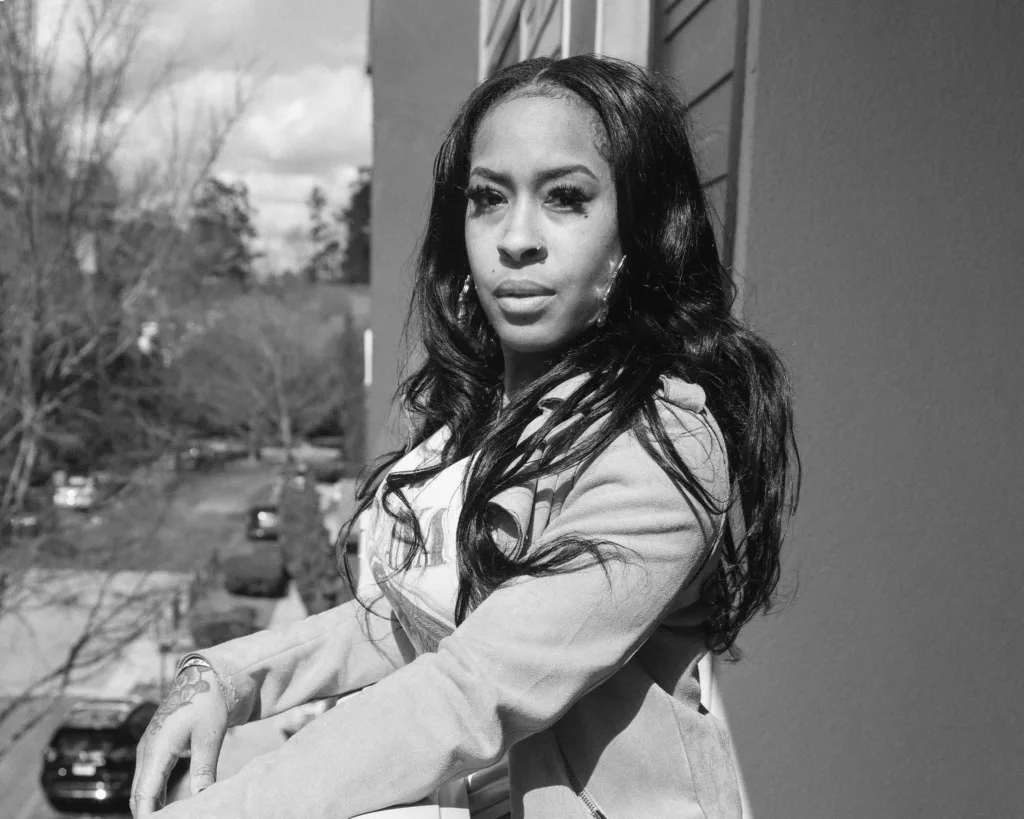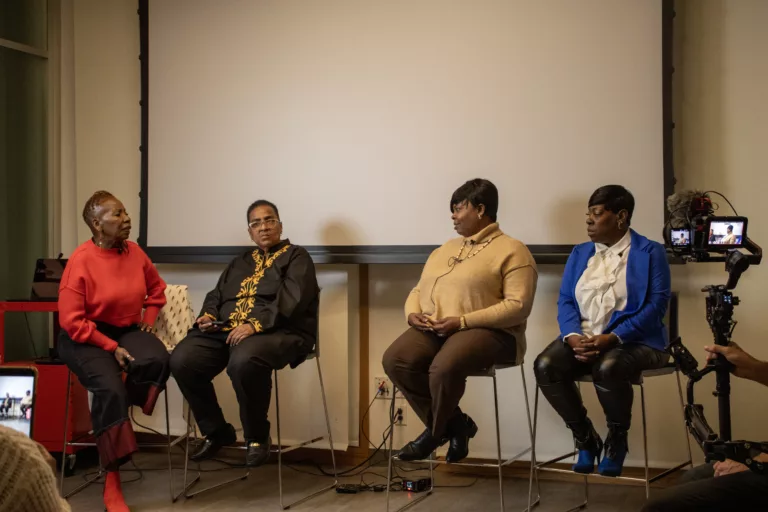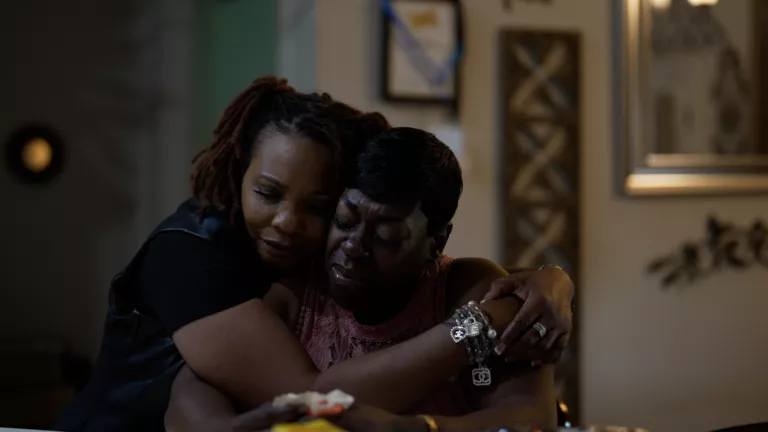Christamy Demory and her daughter, who was born in prison, still experience the trauma of being separated
By Rebekah Sager

Christamy Demory was 18 years old and three months pregnant when she began serving a five-year prison sentence in Maryland for gun possession.
Her daughter Na’lah was born behind bars. Two days later, Demory gave the newborn to her mother to raise while she completed her sentence. It’s a traumatic experience for many incarcerated women and their children that has long-term effects.
Nearly 60% of women in prison are mothers, and 4% are pregnant when they are incarcerated, according to the Prison Policy Initiative. Yet there are few programs to help them and their children maintain the bonds they lose—or never form—because of incarceration.
Although it’s been a decade since her release from prison, Demory, 33, says the trauma of being separated from Na’lah remains fresh.
“I still get therapy for it. It still hurts me because I'm literally mourning the baby that I had to give up at the hospital,” she says. “So even though she was five when I came home, that wasn't what I left.”
Today, Demory is an assistant to Pamela Winn, the founder of RestoreHER, an Atlanta-based nonprofit that supports formerly incarcerated women of color. Demory talked to Colorlines about becoming a mother behind bars and her ongoing journey to bond with her now 14-year-old daughter.
“As soon as the baby came out, they put the cuffs back on my ankle and my wrist.”
Demory wasn’t moved to a maternity ward until two weeks before her due date. She spent most of her pregnancy in general population.
“It was horrible because you're pregnant, so they're not feeding you ideal food. You're going through different hormone changes. I got into several fights, and they didn't really care,” she says.
When she finally went into labor, Demory says she was shackled to the bed until she began delivering the baby. “They wanted me to give birth with my arm and ankle shackled to the bed,” she says.
But a doctor intervened. “She told them, 'You have to take her out of them. She cannot have a baby like this. I promise you she won't try to escape,’” Demory says. “She made them take the cuffs off. But as soon as that baby came out, they put the cuffs back on my ankle and my wrist.”
Two days later, Demory gave her mother temporary legal custody of Na’lah. (Her father wasn’t a part of her life.) Demory and her newborn were allowed two days in the maternity ward together while correctional officers watched them.
Since the prison did not give her medication to dry up her breast milk, Demory began expressing it into soda bottles she collected from other inmates. She says a correctional officer, who was a close friend, would put the breastmilk in the freezer and deliver it to her mother. But that only lasted for a couple of weeks.
By the time Demory returned to her prison cell, she’d fallen into a deep depression. She lost a lot of weight and attempted to end her life more than once using her stash of prescribed antidepressants.
“I just wanted to die because I was going through postpartum, but I couldn't understand that. And then I felt alone because when I was pregnant, she was there with me. So I would rub my stomach. I would talk to her. When I went back [to my cell], she wasn't there anymore. I felt more alone than ever,” Demory says.
“You got to go back to your cell without your kid. You just don't even want them to come.”
The only way she got through her sentence was to try to forget she had a baby.
“If you go in there crying and doing all that, you're going to do your time long and hard because you got women in there that are lifers that are not coming home,” she says. “So they could care less about you just having a baby, about you crying, about a five-year sentence. They don't care about that.”
She says her cellmate told her to stop crying or find another cell.
“They're like, ‘Girl, you got five years. You'll be home before you know it.’ That's how they think. But I'm like, what, five years? I'm not seeing my baby. Like, are you crazy?”
In the five years that Demory served, she didn’t see her daughter often. “I literally can count on my hands how many times I saw her because it was extremely hard for me,” Demory says.
“There was a time I didn't call home for a year. I couldn't handle it. I keep hearing my daughter in the background crying. … I can't tell these people how to deal with her. They’re there,” she says.
“A lot of times, I didn’t want my mom coming to see me because when you walk out of that visiting room, your kid’s got to go, and you can't stay with them,” Demory says. You have to go back to your cell without your kid. You just don't even want them to come.”
“I loved on her extra hard, but it wasn’t enough.”
When Demory was released from prison in 2014, she says Na’lah, then 5 years old, was overly attached to her.
“You can tell she lacked a bonding,” Demory says. “So I loved on her extra hard, but it wasn't enough.”
Demory says her daughter is experiencing a lot of emotional issues.
“I go through so much with her because what they don't realize is when they strip you away from your child and you don't have that bonding time, it affects the child in the future, and it affects my daughter tremendously,” Demory says. “She resents me for going to prison and things that I did when I was younger. I didn't know any better at the time, and she doesn't really understand that.”
“I don't think the system understands that every mother … they bond with their baby.”
A year after Demory was released, she gave birth to a second daughter, Ariyah, now 8.
Na’lah felt that Demory was trying to replace her by having Ariyah. “But that wasn't it. That was just for my mental [health],” Demory says. “I wanted to experience how it was to have a baby because I didn't ever experience it.”
“I don't think the system understands that every mother, even down to birds, cats, dogs, they bond with their baby. So when you break that [bond], it's just horrible. I see the difference with my kids all the time,” Demory says.
Na’lah has gone back and forth between Demory’s and her grandmother’s home.
Demory says she struggles to forgive herself for being in prison and away from Na’lah.
“I can't get back what I lost because it's like mourning a child. … I still cry about the baby, even though [Na’lah] is here and I see her. I cry about the baby that I had to give away.”
Rebekah Sager is an award-winning journalist and author with over a decade of experience. Her work has been published in The Washington Post, The Hollywood Reporter, Playboy magazine, VICE, Cosmopolitan, The Los Angeles Times, AARP, HuffPost and other publications.


